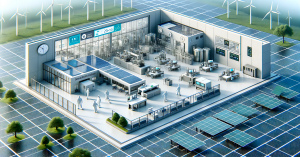Semiconductor Industry 2024: Navigating Digitalization and Low-Carbon Challenges
HONG KONG, CHINA, January 30, 2024 /EINPresswire.com/ -- On a global scale, the semiconductor industry is facing unprecedented opportunities and challenges as it stands at a turning point in its history. As digitalization and low-carbon initiatives accelerate, they are not only reshaping the industry, but also catalyzing innovative collaborations and integrated development. In the post-pandemic era, when the global economy is showing signs of recovery, and digital technologies, such as artificial intelligence, are driving profound market changes, this is particularly noteworthy.
Twin Pillars: Low-Carbon and Digitalization
Low-carbon and digitalization are not only global economic trends, but also critical for the semiconductor industry. As sustainable development becomes a central focus for more companies, particularly in sectors like green energy, electric vehicles, artificial intelligence, and data centers, these factors are significantly influencing the future of the semiconductor industry.
In the energy sector, for example, the development of renewable energy sources such as wind, solar, and hydroelectric power, and low-carbon emission reduction strategies are offering new growth opportunities for the semiconductor industry. Moreover, the use of hydrogen energy in industrial applications, especially green hydrogen generated through renewable energy, is opening new possibilities for carbon emission reduction.
Semiconductors and New Energy Vehicles: A Symbiotic Relationship
The progress in semiconductor technology is driving the development of the new energy vehicle (NEV) sector. The widespread adoption of NEVs is not only instrumental in reducing emissions but also presents new challenges in automobile manufacturing and power generation. To meet these challenges, in-depth collaboration between the automotive industry and semiconductor companies has become increasingly significant.
Smart Manufacturing: The Convergence of Low-Carbon and Digitalization
In the field of smart manufacturing, the convergence of low-carbon and digitalization is already a reality. Numerous manufacturing enterprises are exploring ways to reduce their energy consumption and carbon footprint while maintaining or even enhancing their production capacity. This strategy is not just about cost control; it's also an essential part of sustainable corporate development. By employing digital methods, such as real-time energy consumption monitoring and optimization, companies can more effectively achieve their low-carbon goals.
The Role of Semiconductors in the Internet of Things (IoT)
The evolution of IoT technology is creating new demands for the semiconductor industries. Key requirements in IoT include intelligence, low power consumption, and security. Semiconductor technology plays a pivotal role in fulfilling these demands, thus facilitating the spread and application of IoT devices.
AIoT: Demanding Intelligence, Low Power, and Security
In the AIoT (Artificial Intelligence + Internet of Things) arena, the demands for intelligence, low power consumption, and security are more pronounced. For the semiconductor industry, this represents not only technological challenges but also significant market opportunities. Innovations in semiconductor technology are crucial in addressing these needs.
Creating a Fusion Innovation Ecosystem
Facing these challenges and seizing the opportunities requires semiconductor companies to establish a fusion innovation ecosystem. This ecosystem promotes mutual support and communication between upstream and downstream enterprises, shortens communication gaps, and enhances efficiency in problem-solving. In this system, each component, from upstream raw material supply to downstream application development, contributes to the industry's sustainable development.
The Critical Role of Research and Development
Continual research and development (R&D) play a crucial role in the semiconductor industry's ability to keep pace with rapid changes. Investments in R&D not only lead to technological breakthroughs but also ensure that companies remain competitive in a fast-evolving market. This involves not only enhancing existing technologies but also exploring new materials, processes, and design methodologies that can lead to more efficient, powerful, and sustainable semiconductor solutions.
Global Supply Chain and Geopolitical Considerations
The global nature of the semiconductor supply chain means that geopolitical issues can have significant impacts. Companies must navigate complex international relations, trade policies, and regulatory environments. Building resilient supply chains that can withstand geopolitical shifts and disruptions is increasingly important for ensuring steady industry growth.
Educational and Workforce Development
As technology advances, the need for a skilled workforce becomes more apparent. The industry must focus on educational initiatives and training programs to prepare the next generation of engineers and technicians. Collaboration with educational institutions and investment in workforce development are essential to sustain innovation and growth in the semiconductor sector.
Environmental Sustainability and Ethical Considerations
As the industry moves towards low-carbon solutions, environmental sustainability becomes a key focus. This includes not only reducing the carbon footprint of manufacturing processes but also ensuring that products are energy-efficient and environmentally friendly throughout their lifecycle. Additionally, ethical considerations, such as responsible sourcing of materials and fair labor practices, are increasingly important to consumers and stakeholders.
Conclusion
In summary, as digitalization and low-carbon trends continue to evolve, the semiconductor industry finds itself at a new historical junction. Through innovative collaboration, technological integration, and a strong commitment to research, development, and sustainability, the semiconductor industry is well-positioned to tackle the challenges ahead and play a crucial role in the next wave of technological revolution. The industry's future is not just about technological advancements but also about shaping a sustainable, interconnected world.
Alan Smith
Kynix Semiconductor Limited
+852 8174 2111
info@kynix.com
Legal Disclaimer:
EIN Presswire provides this news content "as is" without warranty of any kind. We do not accept any responsibility or liability for the accuracy, content, images, videos, licenses, completeness, legality, or reliability of the information contained in this article. If you have any complaints or copyright issues related to this article, kindly contact the author above.

